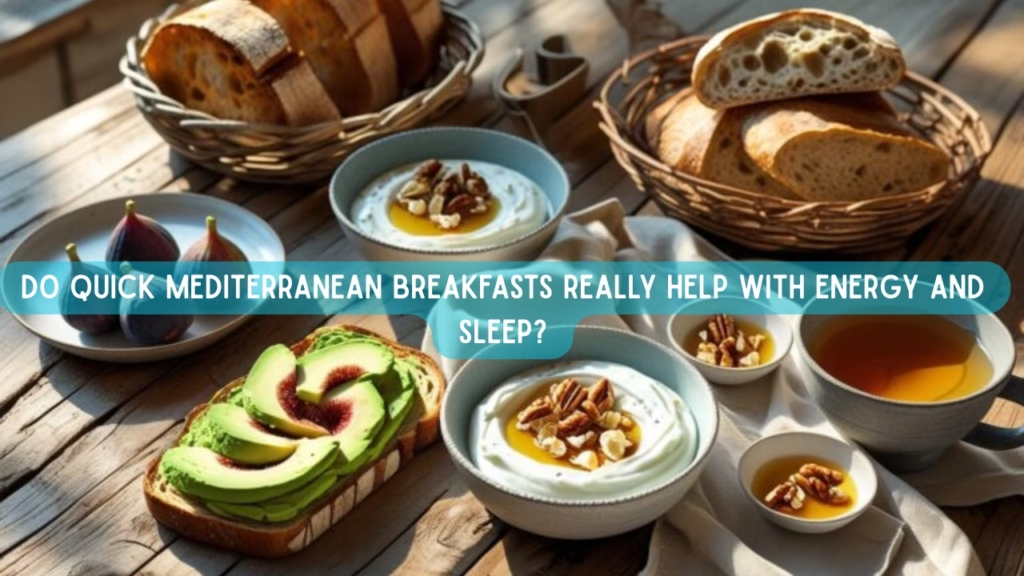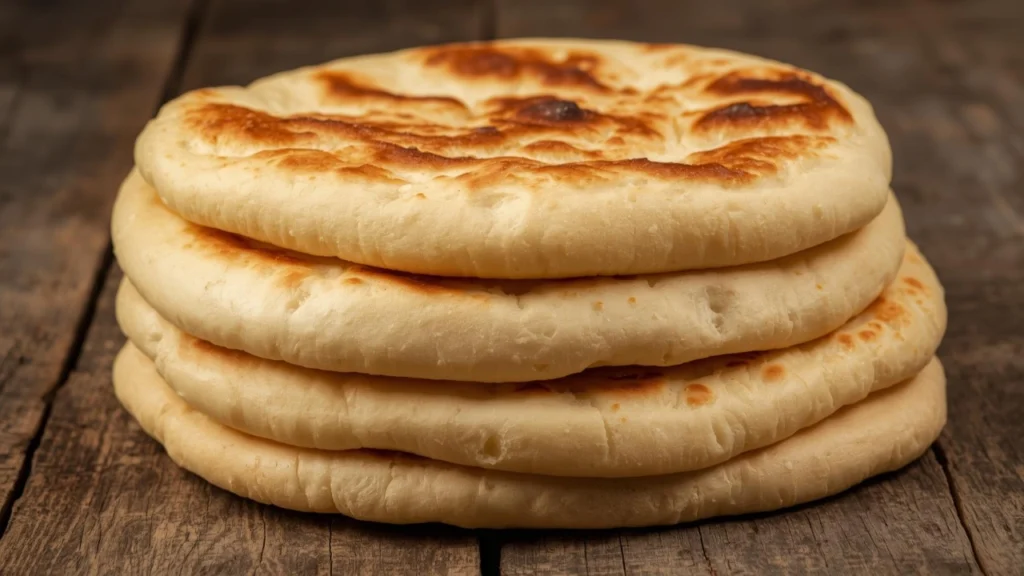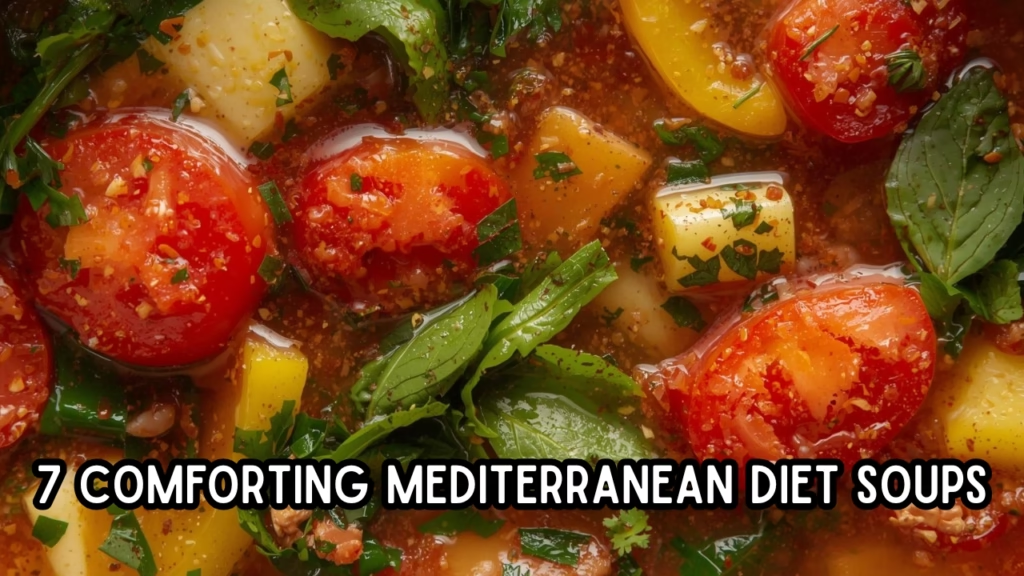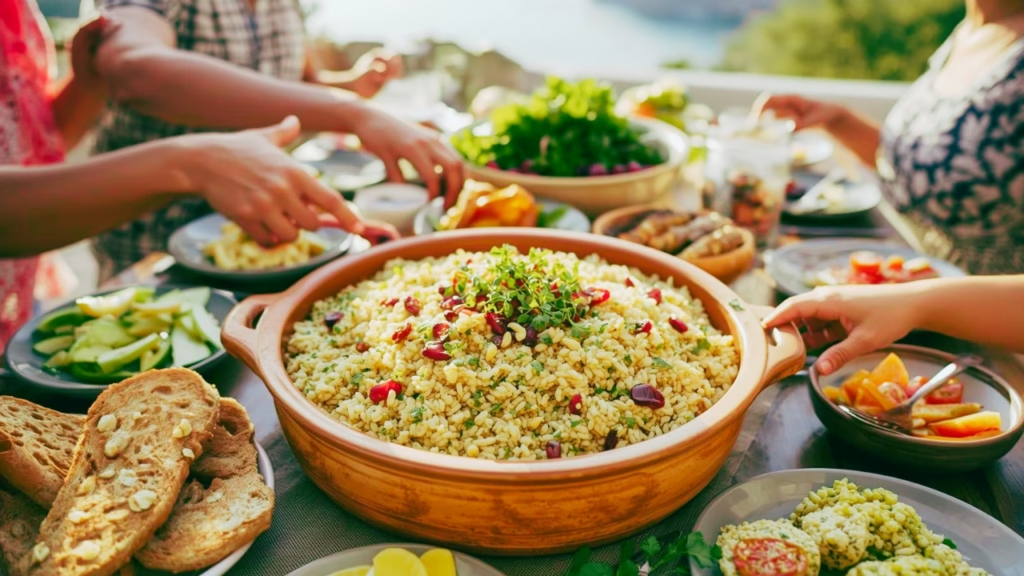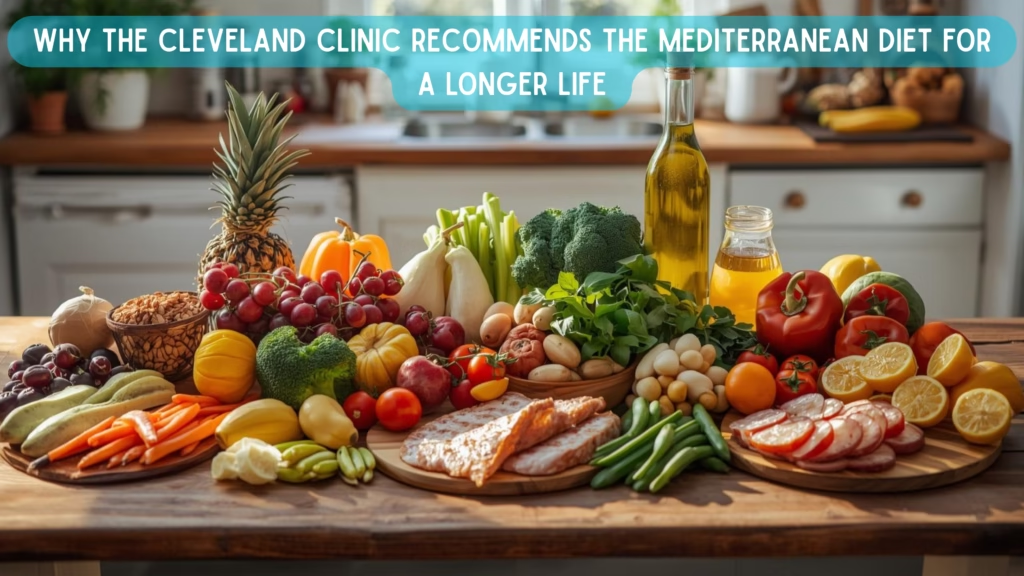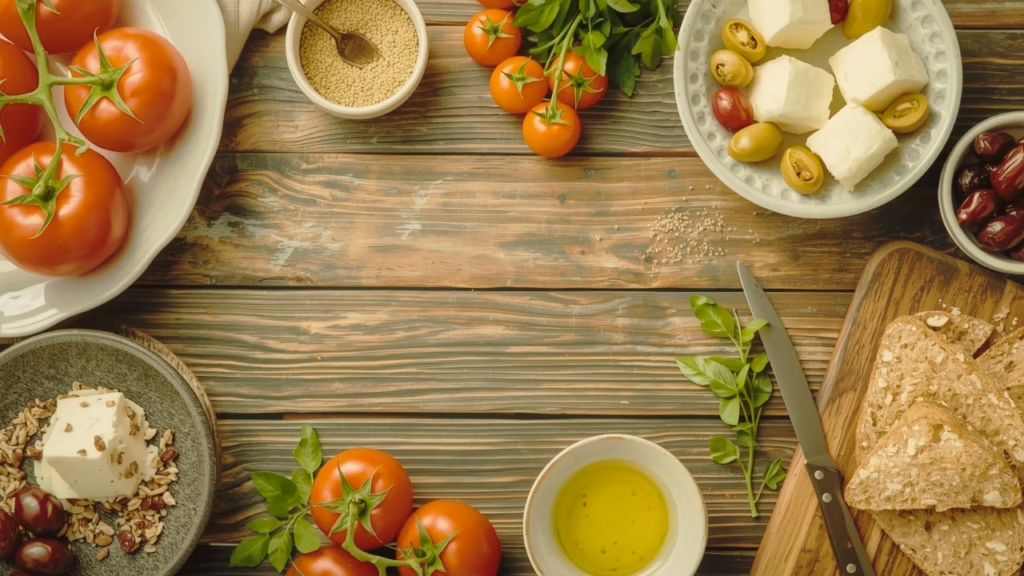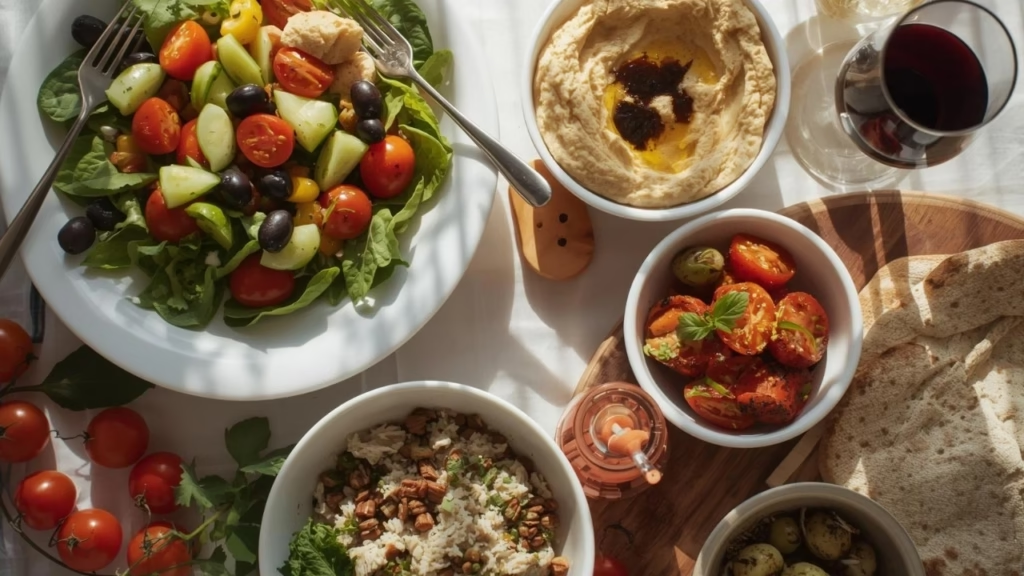Do Quick Mediterranean Breakfasts Really Help with Energy and Sleep?
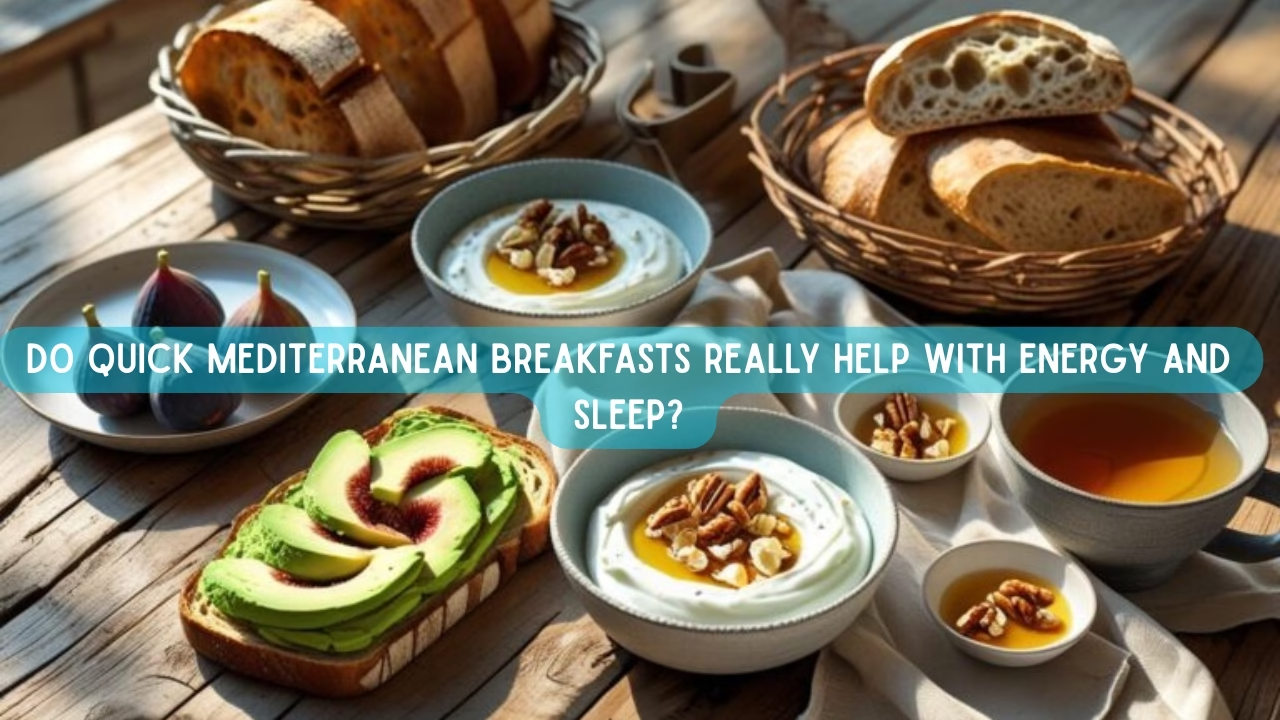
Yes, they absolutely do. Quick Mediterranean breakfasts for energy and better sleep work because they combine slow-digesting whole grains, healthy fats, and nutrients like magnesium and tryptophan that support both sustained energy during the day and deeper sleep at night. Instead of the blood sugar roller coaster you get from sugary cereals or pastries, these breakfasts give you steady fuel that lasts for hours.
I know it sounds too good to be true—one type of breakfast improving both your morning energy and your nighttime sleep. But the connection makes perfect sense when you understand how these foods work in your body.
Why Quick Mediterranean Breakfasts for Energy and Better Sleep Actually Work
Most breakfast foods fail you in one of two ways: they either leave you starving by 10 AM or they’re so heavy you feel sluggish all morning. Mediterranean breakfasts avoid both traps.
When you start your day with whole grains, nuts, fruits, and healthy fats, your body digests them slowly. This means energy gets released gradually instead of all at once. No spike, no crash, just steady fuel that keeps you going until lunch without needing snacks.
But here’s the part people don’t talk about enough: what you eat in the morning affects how you sleep at night. Foods rich in magnesium like almonds and walnuts help your nervous system relax. Tart cherries contain natural melatonin that supports your sleep cycle. Oats provide tryptophan, which your body converts into serotonin and then melatonin.
The Mediterranean approach also keeps your blood sugar stable throughout the day. When you combine protein from Greek yogurt or eggs with healthy fats from olive oil or avocado, you prevent those afternoon crashes that make you reach for coffee and sugar just to survive until dinner.
Your brain benefits too. Omega-3 fatty acids from chia seeds, walnuts, and flaxseeds support focus and mental clarity. This is why people who eat Mediterranean breakfasts often report being more productive and less foggy-headed during morning work sessions.
The research backs this up. Studies on the Mediterranean diet consistently show improvements in energy levels, sleep quality, cognitive function, and overall wellbeing. This isn’t trendy diet advice—it’s an eating pattern that’s kept people healthy for thousands of years.
What Quick Mediterranean Breakfasts for Energy and Better Sleep Look Like
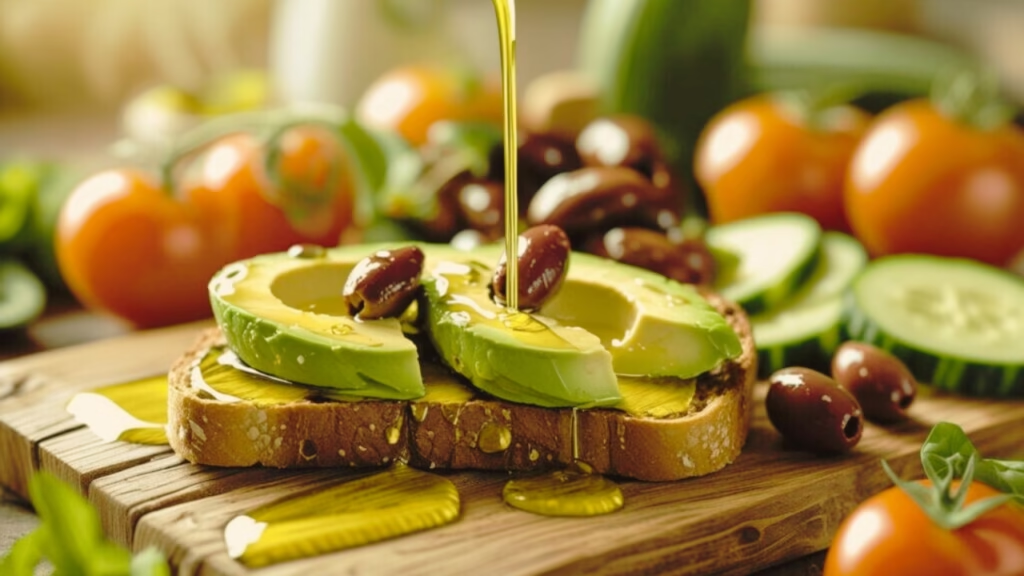
Let’s get practical. These aren’t complicated recipes that require an hour of prep time. They’re simple breakfasts you can actually make on a weekday morning.
Avocado toast on whole-grain bread drizzled with good olive oil and topped with cherry tomatoes and a sprinkle of sea salt. The healthy fats keep you satisfied while the whole grains provide lasting energy. Add a poached egg if you want extra protein.
Greek yogurt bowl loaded with chopped walnuts, fresh figs or berries, and a small drizzle of honey. The protein from yogurt, healthy fats from nuts, and natural sugars from fruit create a perfectly balanced meal. Walnuts are especially good because they contain both omega-3s and melatonin.
Overnight oats made with rolled oats, almond milk, chia seeds, and tart cherries. Mix it the night before and grab it from the fridge in the morning. The tart cherries are key here—they’re one of the few natural food sources of melatonin.
Vegetable omelet filled with spinach, bell peppers, tomatoes, and crumbled feta cheese, cooked in olive oil. This gives you protein, vitamins, minerals, and those crucial healthy fats. It’s filling enough to power you through a busy morning.
Smoothie blended with banana, oats, chia seeds, almond butter, and unsweetened almond milk. Portable, quick, and balanced. The oats make it thick and satisfying, while the banana adds natural sweetness and potassium.
Whole-grain toast topped with almond butter, sliced banana, and a sprinkle of cinnamon. Simple but effective. The combination of complex carbs, protein, and healthy fats keeps your blood sugar stable.
Each of these quick Mediterranean breakfasts for energy and better sleep takes less than ten minutes to prepare. Some take less than five if you’ve done a little prep work the night before.
How to Make These Breakfasts Part of Your Actual Routine
Having good intentions about breakfast is easy. Actually eating well when you’re rushed and tired on a Tuesday morning is harder. Here’s how to set yourself up for success.
Prep what you can the night before. Mix up overnight oats or chia pudding before bed. Chop vegetables for your omelet. Hard-boil eggs on Sunday and keep them in the fridge all week. Even small amounts of prep eliminate morning decision fatigue.
Stock your pantry with the right staples. Keep rolled oats, various nuts, chia seeds, flaxseeds, good olive oil, and whole-grain bread on hand. When you have these basics available, healthy breakfasts become effortless.
Rotate your fruits based on what’s in season. Figs in late summer, berries in spring and summer, apples and pomegranates in fall, citrus in winter. This keeps things interesting and usually saves you money.
Make extra when you cook. If you’re making a vegetable omelet, cook enough for two or three days. Cut it into portions and reheat slices throughout the week. Same goes for any cooked whole grains like farro or quinoa.
Rethink your morning coffee habit. I’m not saying eliminate coffee entirely, but maybe replace your second or third cup with green tea or chamomile. Too much caffeine, especially later in the morning, can interfere with sleep that night. Green tea gives you a gentler energy boost with less sleep disruption.
Start with just one swap. Don’t try to overhaul everything at once. This week, replace your usual breakfast with just one of these Mediterranean options and see how you feel. Notice your energy levels at 11 AM. Pay attention to whether you’re hungry before lunch. Check in with how you sleep that night.
Understanding the Nutrition Behind Better Energy and Sleep
Let’s break down what makes these breakfasts work so well without getting too technical.
A good Mediterranean breakfast typically includes about 40-50% of calories from carbohydrates—but these are quality carbs from whole grains, fruits, and vegetables, not refined sugar or white flour. Your body processes them slowly, which means steady energy release.
Protein makes up about 20-25% of the meal from sources like Greek yogurt, eggs, nuts, and seeds. This protein keeps you full and provides the amino acids your body needs, including tryptophan for sleep.
Healthy fats account for 25-30% from olive oil, avocados, and nuts. These fats slow digestion even further, help you absorb vitamins, and keep you satisfied.
You’re also getting plenty of fiber from whole grains, fruits, and any vegetables you include. This fiber helps regulate blood sugar, supports digestion, and contributes to that feeling of fullness.
The sleep-supporting nutrients deserve special mention. Magnesium from almonds and walnuts helps your muscles relax and your nervous system calm down. Tryptophan from oats and nuts is a precursor to serotonin and melatonin. Melatonin from tart cherries directly supports your natural sleep-wake cycle.
What You’ll Actually Notice When You Eat This Way
The changes aren’t subtle. Most people notice differences within just a few days of switching to quick Mediterranean breakfasts for energy and better sleep.
Your mornings feel different. Instead of dragging yourself through the early hours powered by coffee and willpower, you have genuine energy. You can focus on work without that desperate 10 AM snack run.
Your afternoons improve. Without the morning blood sugar crash, you don’t hit that brutal 2 PM wall where you’d normally need another coffee or something sweet just to function.
Your sleep gets better. You fall asleep more easily because your blood sugar is balanced and you’re not dealing with the after-effects of too much caffeine or sugar from earlier in the day. You sleep more deeply and wake up feeling more rested.
Your mood stabilizes. When your energy and sleep improve, everything else follows. You’re less irritable, more patient, and better able to handle stress.
You stop thinking about food constantly. When you’re properly nourished in the morning with balanced nutrients, you’re not obsessing about your next meal or fighting cravings all day.
Why This Works Better Than Other Breakfast Approaches
Mediterranean breakfasts aren’t trying to be extreme or revolutionary. They’re not keto, not super low-carb, not juice cleanses, not anything restrictive or punishing.
They’re just balanced, whole food meals that happen to align perfectly with what your body actually needs for energy and sleep. The approach has been refined over thousands of years by entire cultures, not invented last year by someone trying to sell you something.
You’re eating real food that tastes good. There’s no choking down protein shakes or eating the same bland meal every single day. Mediterranean breakfasts have variety, flavor, and satisfaction built in.
The habits are sustainable. You can eat this way forever because you’re not eliminating entire food groups or following arbitrary rules. You’re just choosing quality ingredients and preparing them simply.
Starting Tomorrow Morning
You don’t need to wait until Monday or the first of the month. Tomorrow morning, make one simple swap.
If you usually grab a muffin or donut, have Greek yogurt with nuts and berries instead. If you typically eat cereal, try overnight oats with chia seeds and fruit. If you’re a toast person, switch to whole-grain bread with avocado and tomatoes.
Pay attention to how you feel at 10 AM, 2 PM, and when you’re trying to fall asleep that night. Notice whether you needed your usual mid-morning snack. Check if you had that afternoon energy crash.
One breakfast won’t transform your life, but it will show you the difference real food makes. And that’s usually enough to make you want to keep going.
Quick Mediterranean breakfasts for energy and better sleep aren’t complicated. They’re just smart choices that work with your body instead of against it. Give them a week and see for yourself.
SOURCES
We carefully draw from trusted, evidence-backed sources—including peer-reviewed studies, respected academic institutions, and authoritative health organizations—to ensure the accuracy and reliability of every insight we share.
Harvard Health Blog – Shows Mediterranean foods like fatty fish, nuts, and tart cherries improve sleep naturally.
eBioMedicine Study – PUFA-rich foods (nuts, seeds) linked to better energy and reduced daytime sleepiness.
PMC Systematic Review – Mediterranean diet improves sleep quality, duration, and reduces insomnia.
You might also like
How to Make Homemade Pita Bread. A Simple Step-by-Step Guide
Pita Bread Making Pita bread represents one of the oldest forms of bread still commonly…
7 Comforting Mediterranean Diet Soups Made with Simple, Healthy Ingredients
Mediterranean diet soups represent a cornerstone of one of the world’s healthiest eating patterns, combining…
I’m from Bhutan. Here’s How I Combined Local Foods with the Mediterranean Diet for Better Energy
Growing up in Phuntsholing, I never imagined that the traditional Bhutanese foods my grandmother cooked…
Mediterranean Diet Whole Grains: The Complete Guide to Heart Health and Longevity
Mediterranean Diet Whole Grains: The Complete Guide to Heart Health and Longevity Mediterranean diet whole…
How to Combine Asian Spices with the Mediterranean Diet for Maximum Flavor and Health Benefits
Asian spices with the Mediterranean diet create an extraordinary culinary fusion that doesn’t just taste…
Cleveland Clinic Mediterranean Diet: Why It’s Best for a Longer Life
Why the Cleveland Clinic Recommends the Mediterranean Diet for a Longer Life Cleveland Clinic Mediterranean…

Hello! I’m Sangay Choda, the creator of Mediterranean Diet Choice.
I’m not a doctor or licensed dietitian — I’m a health enthusiast who has spent years exploring the Mediterranean lifestyle and its proven benefits for long-term wellness, balance, and longevity.
My interest in this way of living began with a simple goal: to understand how everyday food choices can protect our hearts, improve energy, and support a happier life. Over time, I have researched and curated information from trusted medical and nutritional authorities, such as:
Harvard T.H. Chan School of Public Health
Mayo Clinic
World Health Organization (WHO)
National Institutes of Health (NIH) and more
I take complex, research-backed insights from these sources and transform them into easy-to-read, practical guides that anyone can apply — especially those looking to live healthier without restrictive diets or complicated plans.
While I do not offer medical advice, every article on this website is created with care, transparency, and a commitment to evidence-based information. My mission is to help readers make informed choices for a balanced, Mediterranean-inspired lifestyle.
Disclaimer: The content on this site is for informational and educational purposes only and should not be used as a substitute for professional medical advice. Always consult a qualified healthcare provider before making significant health or dietary changes. For more details, please visit our Disclaimer page.
For additional information about this website and its purpose, visit our About page. You can also review our Terms & Conditions to understand your rights and responsibilities when using this site.
Thank you for visiting Mediterranean Diet Choice.If you have questions, suggestions, or wish to collaborate, feel free to reach out at contact@mdietchoice.com or contact us.

